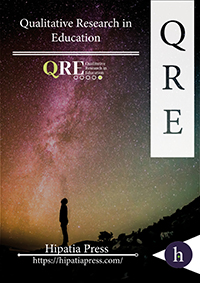Double-loop Learning: A Coaching Protocol for Enhancing Principal Instructional Leadership
Keywords:
Downloads
Abstract
Executive coaching has become increasingly commonplace in both the corporate and non-profit sectors as a means of improving professional effectiveness but there is a dearth of empirically-based protocols geared specifically toward the growth needs of school principals. This qualitative case study explores the implementation of a principal coaching protocol using a theories of practice framework based on concepts originally articulated by Argyris and Schön (1974) and further explicated by the authors in previous publications. This study examined the extent to which a coaching protocol based on theories of practice enhanced principals’ self-perceived capacity for reflection and effective instructional leadership. Findings suggest that principals valued the structure, feedback, and reflective dimensions of the protocol and found their confidence level about an important instructional leadership problem - how to support and assist struggling teachers improve their teaching practice - was greatly enhanced. Implications for further iterations of the coaching protocol, as well as future directions of research on principal professional growth, are discussed.Downloads
References
Aguilar, E., Goldwasser, D., & Tank-Crestetto, K. (2011, October). Supporting principals,
Google Scholar Crossreftransforming schools. Educational Leadership, 69(2), 70-73.
Google Scholar CrossrefArgyris, C., & Schön, D. (1974). Theory in practice: Increasing professional
Google Scholar Crossrefeffectiveness. San Francisco: Jossey-Bass.
Google Scholar CrossrefBlase, J., & Blase, J. (1999). Principals’ instructional leadership and teacher
Google Scholar Crossrefdevelopment: Teachers’ perspectives. Educational Administration Quarterly, 35 (3), 349-378.
Google Scholar CrossrefBlase, J., & Kirby, P. C. (2000). Bringing out the best in teachers: What effective
Google Scholar Crossrefprincipals do. Thousand Oaks, CA: Sage.
Google Scholar CrossrefDeBevoise, W. (1982, Winter). The principal’s role: How do we reconcile expectations
Google Scholar Crossrefwith reality? R & D Perspectives.
Google Scholar CrossrefFay, J., & Funk, D. (2011). Teaching with love and logic: Taking control of the classroom.
Google Scholar CrossrefGolden, CO: Love & Logic Press.
Google Scholar CrossrefFerry, N. M., & Ross-Gordon, J. M. (1998). An inquiry into Schön’s epistemology of
Google Scholar Crossrefpractice: Exploring links between experience and reflective practice. Adult Education Quarterly, 48 (2), 98-113.
Google Scholar CrossrefFriedman, V., & Lipshitz, R. (1992). Teaching people to shift cognitive gears:
Google Scholar CrossrefOvercoming resistance on the road to Model II. Journal of Applied Behavioral Science, 28, 118-136.
Google Scholar CrossrefGlaser, B. G., & Strauss, A. (1967). Discovery of grounded theory: Strategies for
Google Scholar Crossrefqualitative research. Mill Valley, CA: Sociology Press.
Google Scholar CrossrefHallinger, P. (2010). Leadership for learning: Lessons from 40 years of empirical
Google Scholar Crossrefresearch. Journal of Educational Administration, 49(2), 125-142.
Google Scholar CrossrefHunter, F. (1953). Community power structure. Chapel Hill: University of North
Google Scholar CrossrefCarolina Press.
Google Scholar CrossrefKirby, P. C., & Paradise, L.V. (1992). Reflective practice and effectiveness of teachers.
Google Scholar CrossrefPsychological Reports, 70, 1057-1058.
Google Scholar CrossrefKirby, P.C., & Teddlie, C. (1989). Development of the Reflective Teaching Instrument.
Google Scholar CrossrefJournal of Research and Development in Education, 22(4), 45-51.
Google Scholar CrossrefLipshitz, R. (2000). Chic, mystique, and misconception. Journal of Applied Behavioral
Google Scholar CrossrefScience, 36, 456-473.
Google Scholar CrossrefMiles, M. B., & Huberman, A. M. (1994). Qualitative data analysis: An expanded
Google Scholar Crossrefsourcebook. Thousand Oaks, CA: Sage.
Google Scholar CrossrefNational Policy Board for Educational Administration (2002). Standards for advanced programs
Google Scholar Crossrefin educational leadership: For principals, superintendents, curriculum directors, and
Google Scholar Crossrefsupervisors.
Google Scholar CrossrefPeterson, K. (2002). The professional development of principals: Innovations and opportunities.
Google Scholar CrossrefEducational Administration Quarterly 38(2), 213-232.
Google Scholar CrossrefReeves, D. (2009). Leading change in your school: How to conquer myths, build commitment,
Google Scholar Crossrefand get results. Alexandria, VA: ASCD.
Google Scholar CrossrefReiss, K. (2007). Leadership coaching for educators: Bringing out the best in school
Google Scholar Crossrefadministrators. Thousand Oaks, CA: Corwin Press.
Google Scholar CrossrefRobinson, V. M. J., & Le Fevre, D. M. (2011). Principals’ capability in challenging
Google Scholar Crossrefconversations: The case of parental complaints. Journal of Educational Administration, 49, 227-255.
Google Scholar CrossrefRobinson, V., Lloyd, C., & Rowe, K. (2008). The impact of leadership on student
Google Scholar Crossrefoutcomes: An analysis of the differential effects of leadership types. Educational Administration Quarterly, 44, 635-674.
Google Scholar CrossrefRockoff, J. E. (2004). The impact of individual teachers on student achievement: Evidence from
Google Scholar Crossrefpanel data. American Economic Review 94(2), 247-252.
Google Scholar CrossrefRogers, T. (2004). Managing in the interprofessional environment: A theory of action
Google Scholar Crossrefperspective. Journal of Interprofessional Care 18, 239-249.
Google Scholar CrossrefRuff, W. G., & Shoho, A. R. (2005). Understanding instructional leadership through the
Google Scholar Crossrefmental models of three elementary principals. Educational Administration Quarterly, 41, 554-577.
Google Scholar CrossrefSaldaña, J. (2009). The coding manual for qualitative researchers. Los Angeles: Sage.
Google Scholar CrossrefScherer, M. (2011, October). The art of changing minds. Educational Leadership 69(2), 70-73.
Google Scholar CrossrefTsangaridou, N., & O’Sullivan, M. (2003). Physical education teachers’ theories of
Google Scholar Crossrefaction and theories-in-use. Journal of Teaching in Physical Education, 22(2), 132-153.
Google Scholar CrossrefTschannen-Moran, B., & Tschannen-Moran, M. (2011, October). The coach and the evaluator.
Google Scholar CrossrefEducational Leadership 69(2), 10-16.
Google Scholar CrossrefWise, D., & Jacobo, A. (2010). Towards a framework for leadership coaching. School
Google Scholar CrossrefLeadership and Management, 30(2), 159-169.
Google Scholar CrossrefWitziers, B., Bosker, R. J., & Kruger, M. L. (2003). Educational leadership and student
Google Scholar Crossrefachievement: The illusive search for an association. Educational Administration
Google Scholar CrossrefQuarterly, 39, 398-425.
Google Scholar CrossrefDownloads
Published
Almetric
Dimensions
How to Cite
Issue
Section
License
All articles are published under Creative Commons copyright (CC BY). Authors hold the copyright and retain publishing rights without restrictions, but authors allow anyone to download, reuse, reprint, modify, distribute, and/or copy articles as the original source is cited.















